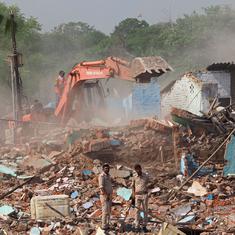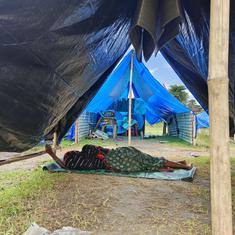“Twenty-five years ago, the Brahmaputra took away our home,” said 38-year-old Safiur Rahman Mondol. “Now, the government has bulldozed it.”
Over two decades ago, Mondol’s home on a char, the temporary sandbar islands of Assam which are regularly swallowed by the Brahmaputra, was washed away.
The family landed up 10 km away at Churuabakra village in Assam’s Dhubri district.
But last month, Mondol’s home and that of 1,400 Muslim families of Bengali origin in the area were demolished to make way for a power project. “My brother and I built the homes after working for the last 25 years,” Mondol said. “We have nothing left now.”
The district authorities designated 300 bighas of land for the rehabilitation of the evicted people, according to a notice issued by the Chapar revenue circle officer. It also granted a one-time relief of Rs 50,000 for residents to transport their belongings.
However, Mondol said he had not received the money, nor would he go to the low-lying riverine area allotted by the district administration. “The river already destroyed us once,” he said. “We won’t go near it.”
Thousands of families in Assam have been made homeless in recent demolition drives.
In seven drives carried out in the last 45 days alone, the Assam government demolished the homes of 5,333 families, a majority of whom are Bengali-origin Muslims, also called Miya Muslims.
Like Mondol, many of these families had lost their homes earlier too – to floods and river erosion.
The BJP’s bulldozer regime
Between 2016, when the Bharatiya Janata Party government came to power, and now, 15,270 families – the majority of them Muslim – have been evicted from government land, according to data provided by the state revenue and disaster management department. At least eight Muslims have been shot dead during evictions carried out since 2016.
The pace of evictions picked up after Himanta Biswa Sarma became chief minister in 2021. In these five years, the government has evicted around 50,000 people from 160 sq km of government land.
There is popular support for the evictions against Bengali-origin Muslims, a community that has long been viewed in Assam as “illegal immigrants” occupying the land of the “indigenous”.
But observers, researchers and politicians told Scroll that vast numbers of evicted migrant cultivators are not a sign of “illegal immigration”. Instead, their continued landlessness is a consequence of an ecological crisis compounded by political discrimination.
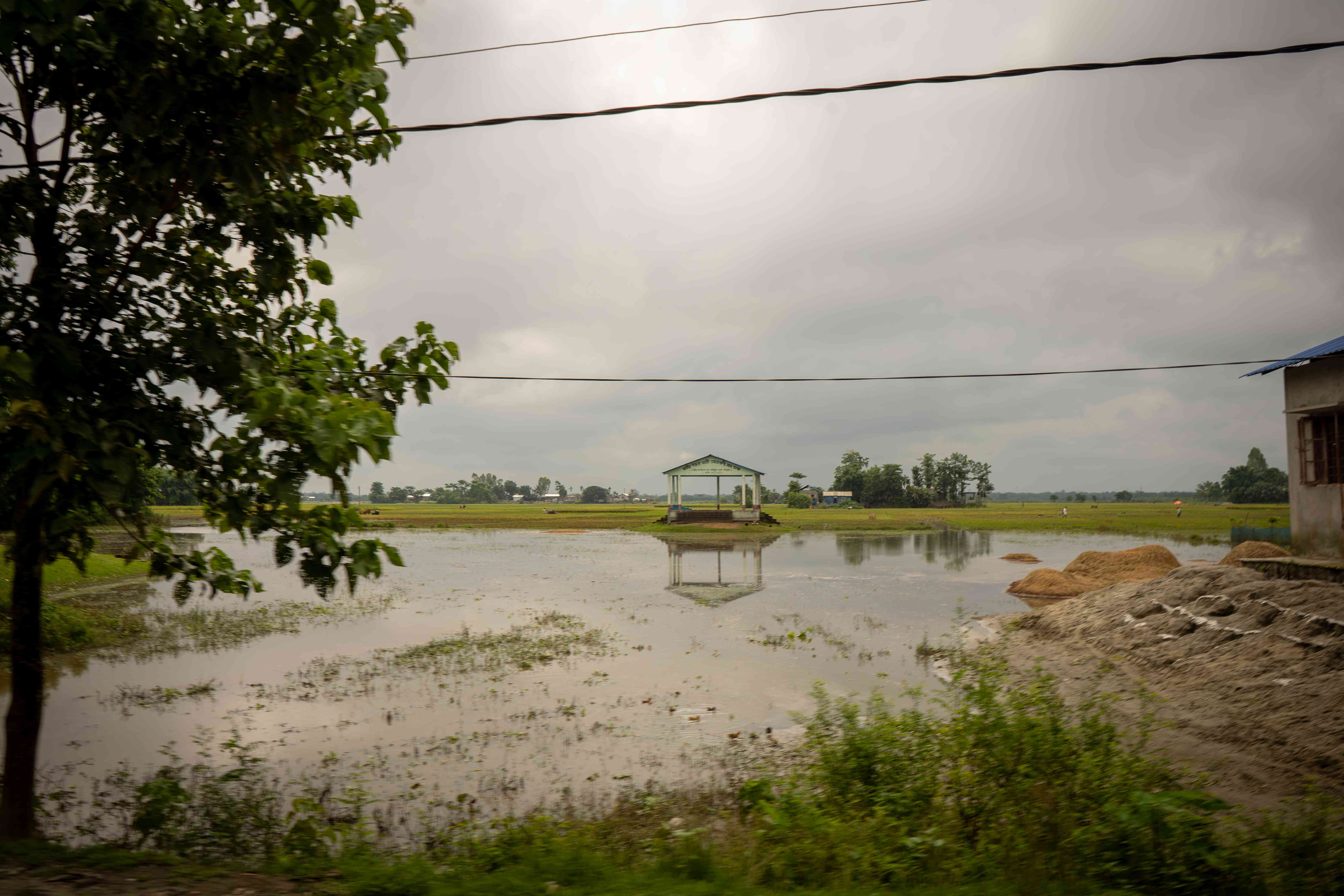
Who is an encroacher?
Land has always been scarce in Assam, as large chunks of the state are regularly washed away by the Brahmaputra and its many tributaries.
That is among a set of reasons that has forced people of all communities to occupy government land – and not just the Bengali-origin Muslims vilified as Bangladeshis.
According to the February 2024 data of Assam’s revenue and disaster management department, which was placed before the Assembly, 7.46 lakh families have settled on government land in the state. Technically, all of them are “illegal encroachers” as they do not have land titles in their name.
In his book In the Name of the Nation: India and its Northeast, political scientist Sanjib Baruah wrote, “...many settlers and their descendants – and not just Miya Muslims – live in and cultivate ‘forest lands’, ‘grazing lands,’ and various kinds of public lands.”
Vasundhara Jairath, who teaches development studies at the Indian Institute of Technology in Guwahati, said that very few people in the rural parts of the state have secure land tenure, at least in the Brahmaputra Valley. “This is not specific to Muslims of Bengali origin as Himanta is making it out to be,” she said.
Indeed, a large section of the 7.46 lakh families belong to communities considered “indigenous” to the state.
For instance, the highest number of families settled on government land – 1.50 lakh – is in Dhemaji district.
Dhemaji, a low-lying district that is extremely vulnerable to floods and erosion, is home to the Mising tribe, which largely lives and cultivates on “community land” with no land titles in any particular person’s name.
However, according to a Scroll analysis of information put out in the state Assembly, Dhemaji does not figure in the list of top five districts where evictions have taken place since 2016. Most of the eviction drives have taken place in districts with large Bengali-origin Muslim populations such as Dhubri, Goalpara and Darrang.
The government’s actions have been accompanied by explicit communal messaging. Sarma has described the evictions as a way to stop “demographic invasion” by “people of one religion”, and as a measure against “land jihad”.
The evictions have stoked considerable resentment against the Bengali-Muslim community. They have faced harassment from Assamese vigilante groups, who have set up “informal checkpoints” to police their movement, asked to show identity documents even while they were leaving their demolished homes, forced to chant “Jai aai Axom” and asked to leave Upper Assam.
“Eviction kore to kore, Bangladeshi naam dei,” 54-year-old Akimon Nessa, sitting near her razed home in Hasilbeel in Goalpara, said. Not only do they evict us, they also brand us Bangladeshis.
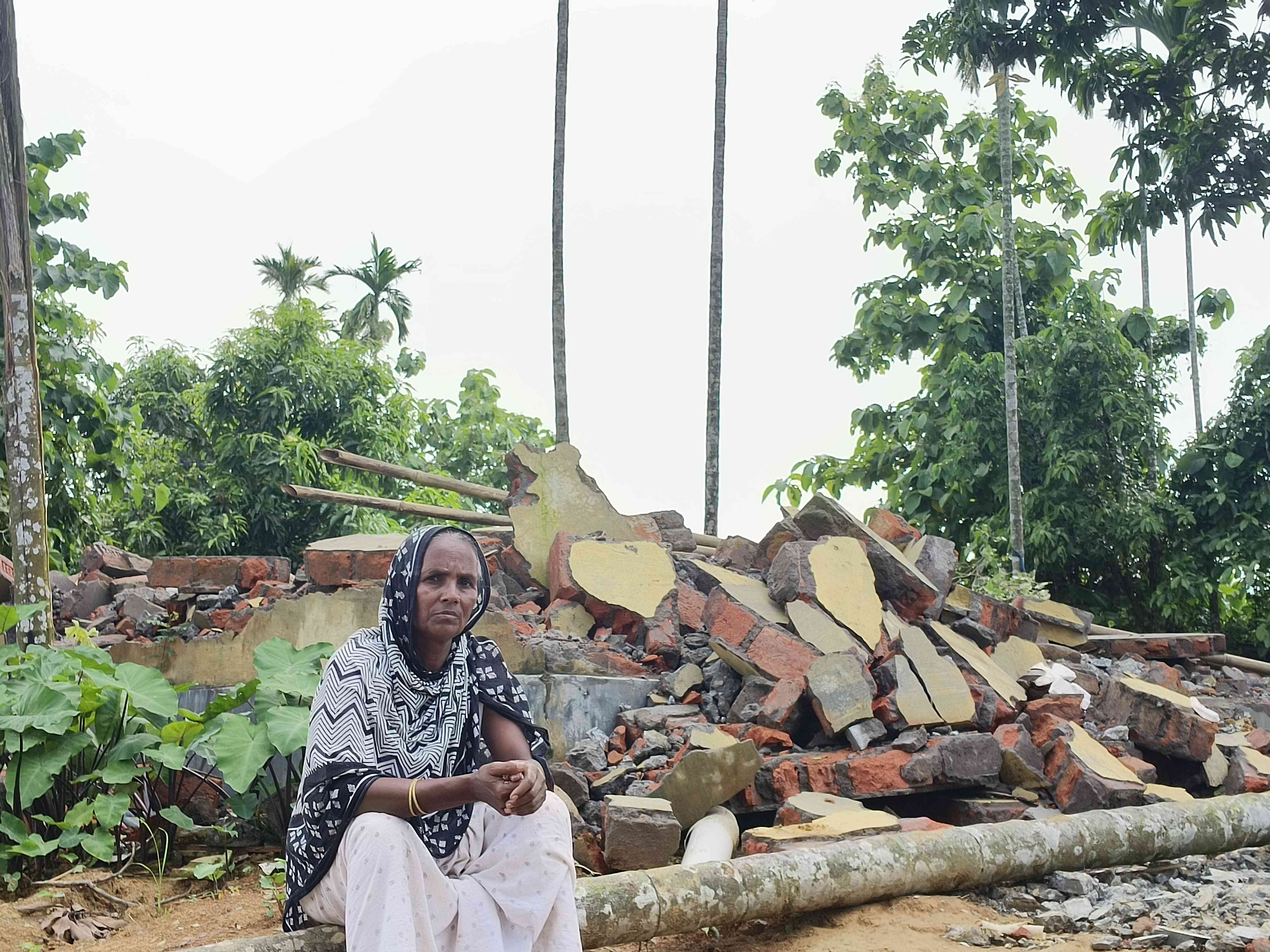
In parallel, the Assam chief minister on August 3 declared that the “unauthorised” occupation of public land by “indigenous” people will not be considered as “encroachment”.
Strikingly, despite decades of debate, there is no legal definition of who the “indigenous” population of Assam are.
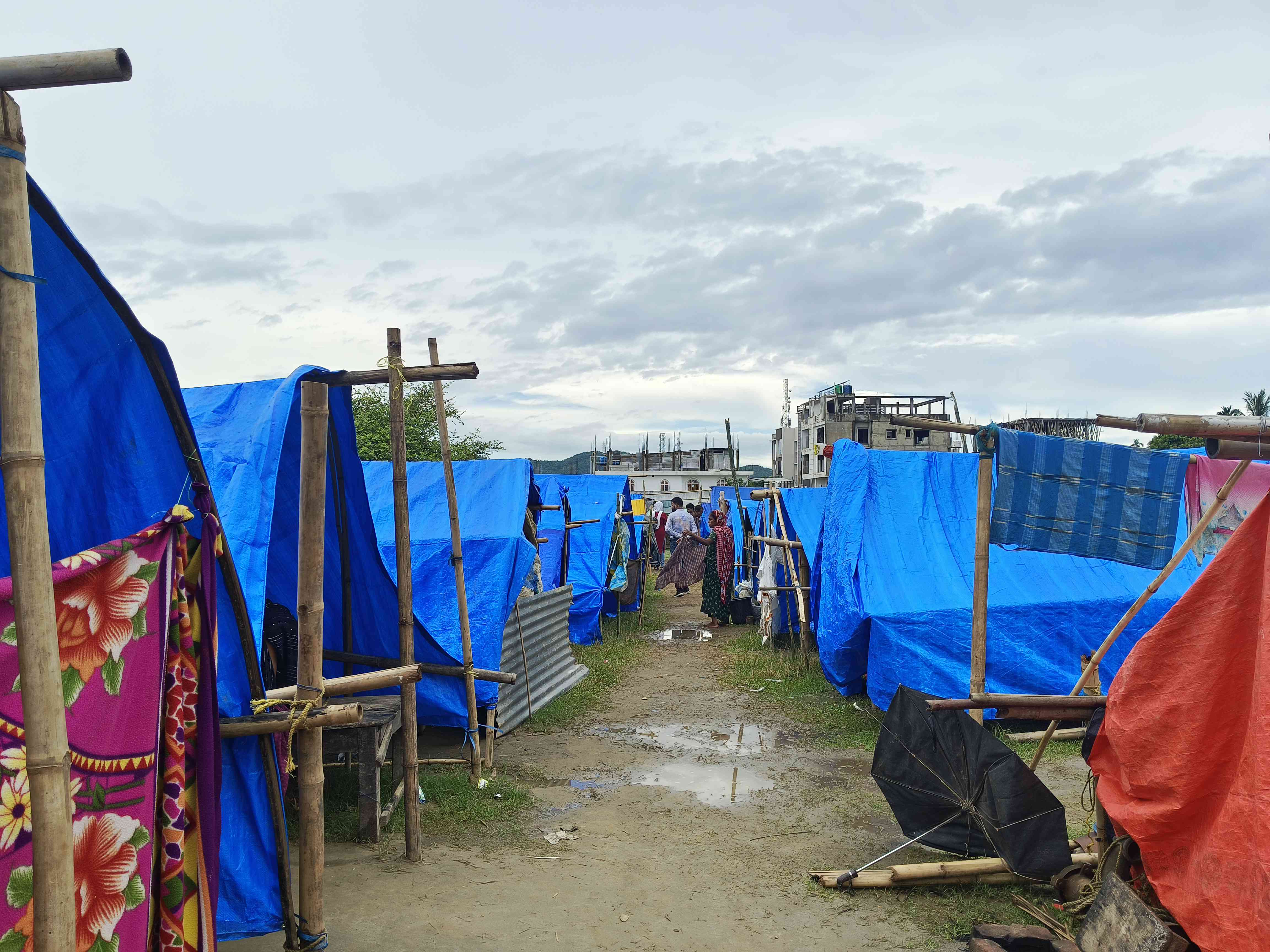
The hungry river
Observers pointed out that the BJP government has overlooked the fact that large sections of the evicted population had settled on forest or government land after losing their homes due to annual floods and erosion.
According to Assam’s water resources department, bank erosion by the rivers has been a serious challenge in the last six decades. Since 1950, over 4.27 lakh hectares of land – 7.40% of Assam’s total area – has been eroded by the Brahmaputra and its tributaries. Moreover, about 39.58 % of the total land area of Assam is flood-prone, according to the government.
The state loses 8,000 hectares of land on an average annually, government figures show. In some places, the width of the Brahmaputra has increased up to 15 km due to bank erosion.
Sherman Ali Ahmed, a suspended Congress legislator from Barpeta district, pointed out that even these figures were an underestimate. “It is from a 2004 report,” he said.
Suprakash Talukdar, from the Communist Party of India (Marxist) in Assam, said, “Apart from the yearly devastating flood, erosion by the Brahmaputra and its tributaries has rendered thousands of families homeless and landless every year.”
However, the government does not recognise erosion as a natural disaster. “There is no policy of compensation or resettlement for the affected people,” Talukdar said. “These homeless people are compelled to take shelter on government land, having no alternative.”
Political scientist Baruah told Scroll that the “legal fiction of forest lands and the suspicion of [Bengal-origin Muslims] being ‘encroachers’ or ‘false nationals’” are laying the ground for the “imaginative work of expulsion”.
“That can happen before the police, the bulldozers arrive to do the physical eviction,” he said.
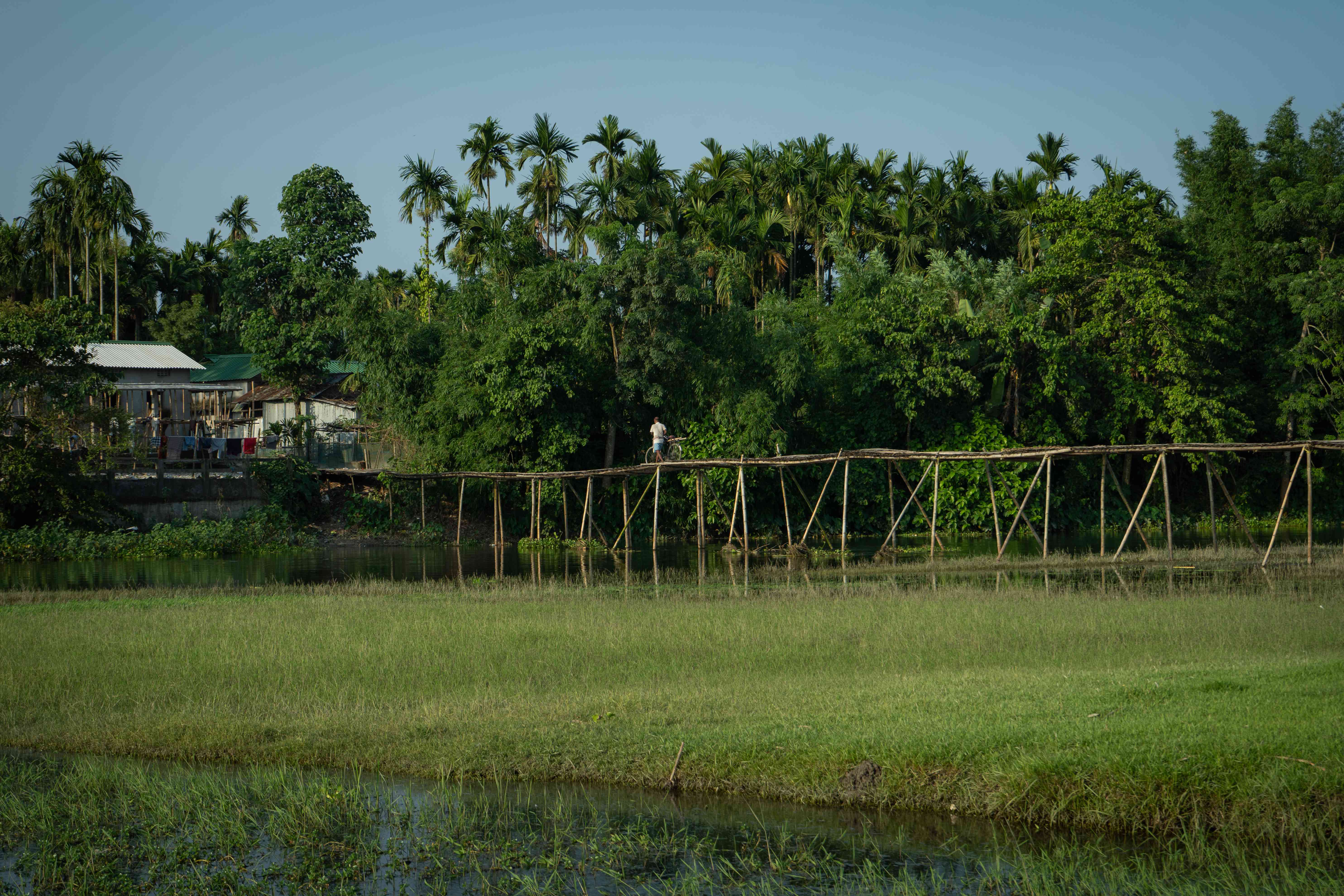
Sociologist Bhargabi Das, who teaches at Shiv Nadar University in the National Capital Region, pointed out that the state has no updated geomorphological data on the Brahmaputra, a river that “actively contributes” to the landlessness of the Bengali-origin Muslim community.
“There is no policy surrounding internally displaced persons,” said Das. “Why? The answer is simple. Because the figure of the Miya Muslim as the illegal immigrant is critical for the majoritarian state and society to survive and flourish,” she said.
In a recent paper, Das argued that the state’s refusal to acknowledge land claims by char-dwellers “makes them politically precarious and turns them into landless labourers”.
“The state practices a systemic refusal politics when it comes to Miya Muslims,” said Das. “It refuses to acknowledge that instead of being illegal immigrants, they are victims of an ecological crisis.”
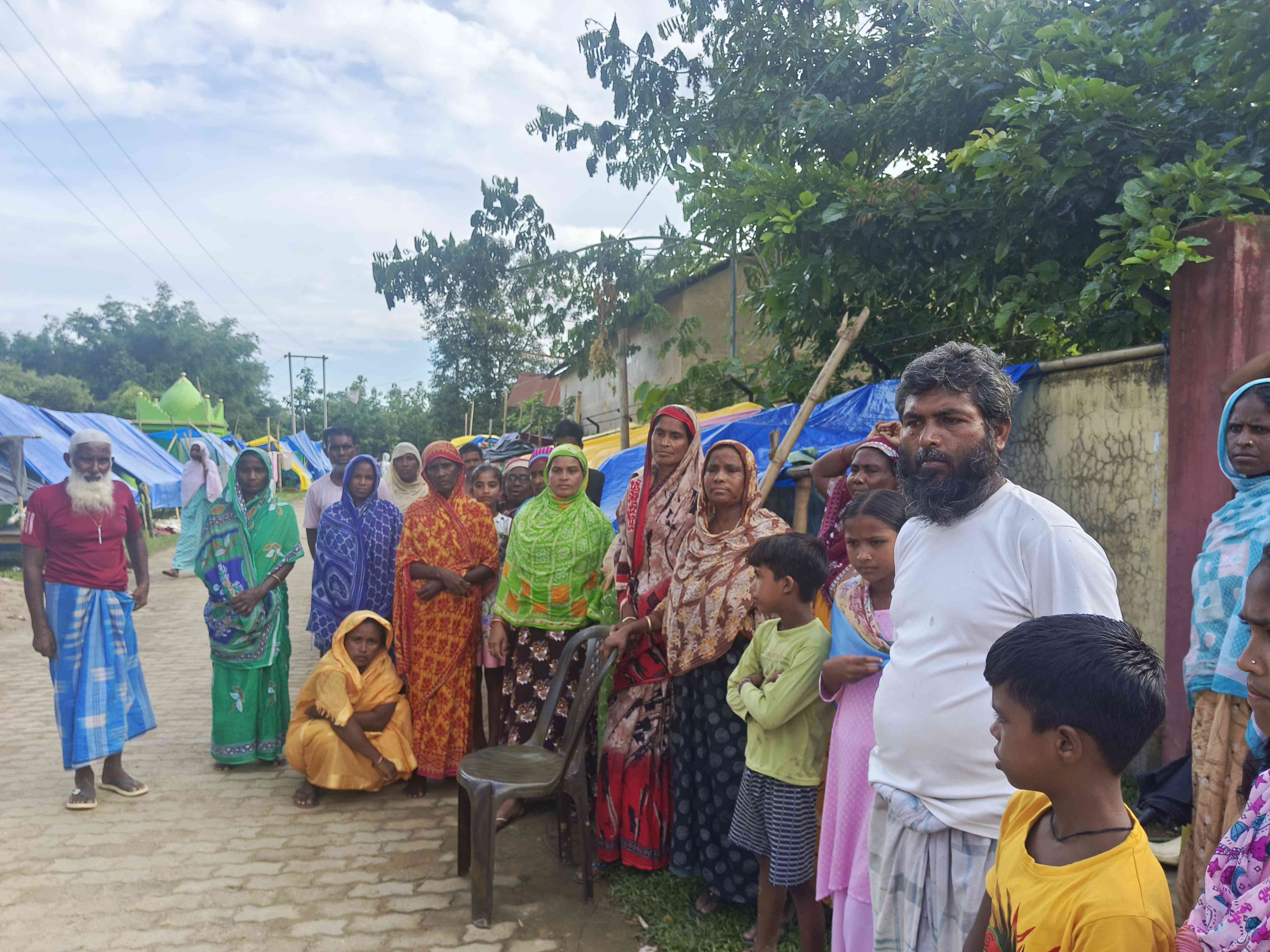
Land settlement
Activists say the problem has been compounded by the lack of initiative by previous governments to help those displaced by erosion and the current government’s discriminatory land policy that has made thousands of Bengali-origin Muslims vulnerable.
“For a long time, the government land policy provided land settlement for ‘encroachers’ after a certain period,” said Talukdar, state secretary of the Communist Party of India (Marxist) in Assam, referring to existing laws for resettling or rehabilitating flood-affected people.
A historian from Assam told Scroll said this is because the government did not always take a grim view of settlers moving in to cultivate grazing land.
“It does not need huge capital or money to clear the land and make it cultivable,” he said. “So, people tend to move there without much interference from the revenue department, which is often understaffed and unable to govern the village grazing lands. Historically, the government has gone on to give land titles to people settled on such land. For example, many caste Hindus have got land titles in Nagaon and middle Assam.”
Every three decades, the state would carry out cadastral surveys to assess claims and grant land titles to the landless who had settled on government land.
However, the government has not undertaken any statewide land survey to give out land titles after 1965, Talukdar said. “As a consequence, thousands of families are now stamped as illegal encroachers and evicted,” he said.
Ahmed, the legislator from Barpeta district, agreed. “This is because the government did not perform its constitutional duties,” he said.
He blamed previous Congress governments for failing to grant land titles to Bengali-origin Muslims. “The Congress did nothing to rehabilitate these homeless people,” he said.
A Congress spokesperson and former MP admitted that the Congress government did not give “adequate” land titles to landless Muslims. “Congress MLAs and ministers from the minority community could have done more,” he said.
In contrast, under the Himanta Biswa Sarma government, as Scroll has reported, the land policy has discriminated against Muslims.
In 2021, the Assam government had launched Mission Basundhara, a scheme that allows the state to regularise land held by cultivators and other occupants without land titles. Under the scheme, the state allocates government land to citizens if they fulfil certain conditions – a process known as settlement of land.
In 2022, families who have become landless labourers due to erosion, ethnic violence and those rehabilitated by the district administration on government land were made eligible for land titles under the scheme.
However, Himanta Biswa Sarma went on to declare in the Assembly last year that landless Bengali-origin Muslims cannot apply for land under the scheme as they are not “indigenous”.
Legislators and experts pointed out that Sarma was introducing a new definition of “indigenous” that is neither valid in Indian law nor has been part of the rules of Mission Basundhara since 2021, when it was first introduced in Assam.
‘This is unfair’
For Bengali-origin Muslims settled on government land, however, that decision slammed a door shut.
Take, for example, Abdul Barek. When he was a child, his family moved to Asudubi village in Goalpara district in 1980, having lost their home to the river.
By then, the area, which was near the Paikan reserved forest, had become home to several landless people from the chars. Barek’s father bought a plot in Asudubi from the “local Muslim people”, the 54-year-old told Scroll. Over the years, the son built a pucca house and a smaller tin shed on the land, and began living there with his wife and two children.
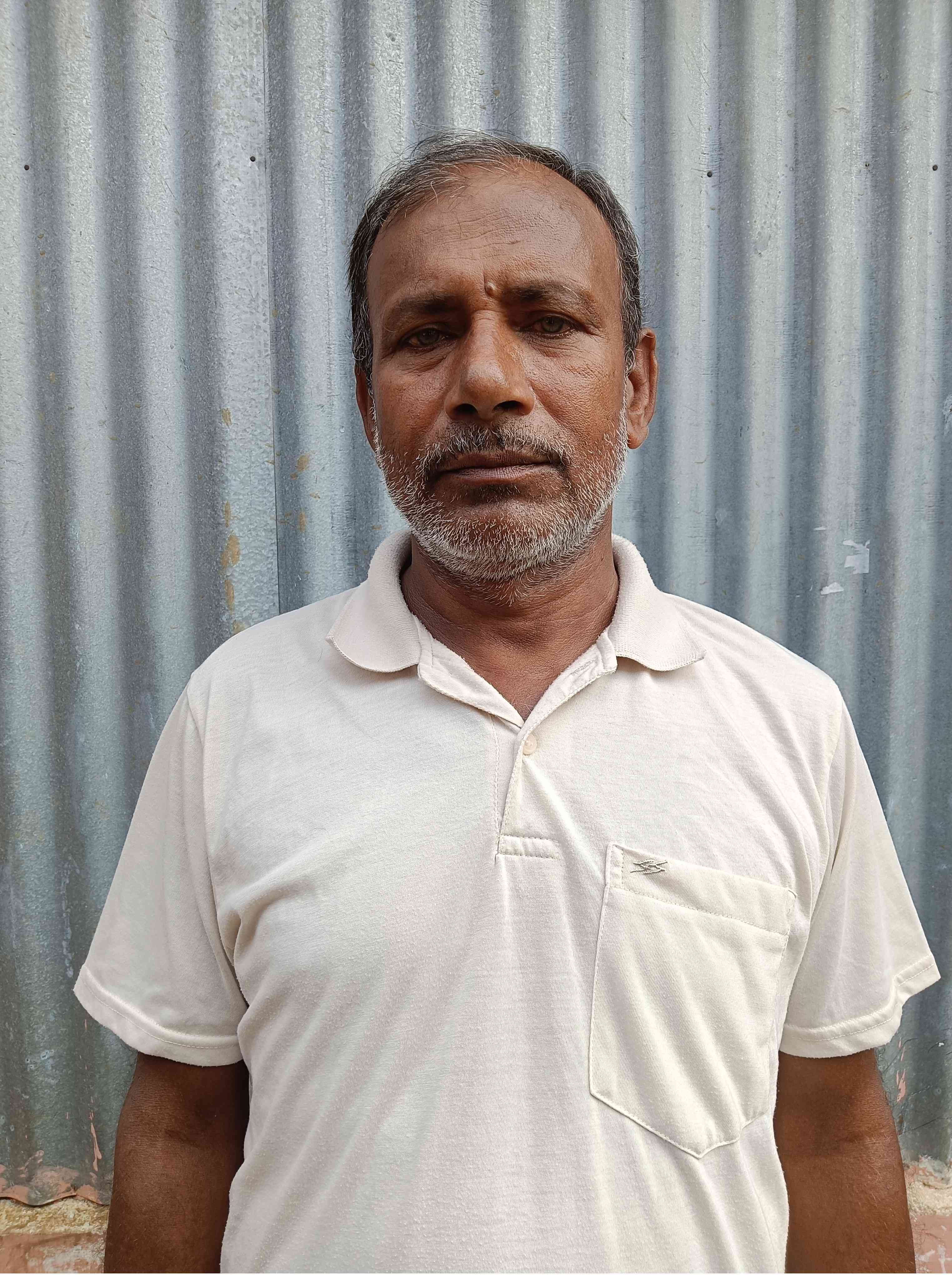
Last month, the bulldozers came for Barek’s home and those of 1,080 other families, who had lived there for over four decades.
Barek pointed out that many people in Asudubi had applied under the Mission Basundhara scheme for settlement of land. “But their applications were rejected on the ground that we are not indigenous people,” Barek said. “This is unfair.”
